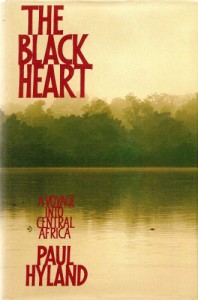The Black Heart
A Voyage into Central Africa
Category: Prose
The Black Heart is a travel book, a literary adventure, an ancestor trail and a personal odyssey. Paul Hyland and his wife travelled light and rough on river-boats, in dug-outs and bizarre vehicles from the River Congo’s mouth, through equatorial forest, to remotest uplands at the heart of Africa.
It is a celebration and critique of present-day Zaire in the best tradition of literary travel writing, counterpointed by the experiences in 1890 of three great writer/adventurers. Joseph Conrad, Polish novelist, went upriver on a “tin-pot steamer” to the Heart of Darkness. Roger Casement, Irish nationalist, exposed Congo Free State atrocities in his Congo Report; and Dan Crawford, Scottish missionary-explorer and Hyland’s great-uncle, at nineteen walked from the west coast into Katanga, completing Livingstone’s last journey. Their books, letters, journals, and especially Casement’s “black diaries” gave Hyland the map for his own journey.
Paul Hyland skillfully interweaves mythology, history, literature, and contemporary reportage into an intensely vivid and powerful experience. Like his predecessors, he discovers that the interior journey presses deeply into the heart.
Published: Gollancz, 1988; Henry Holt (US), 1988; Paragon House (US), 1990
ISBN: 0-575-03687-7
Pages: 288
o.p.
Praise for “The Black Heart: A Voyage into Central Africa”
“A powerful and fascinating journey...his ardent, allusive prose is subtly suited to its subject…this voyage into Conrad’s 'heart of darkness' is steadied by intelligence and a contagious delight in African history.”
Colin Thubron, New York Times Book Review BOOKS OF THE YEAR
“A finely-whittled...journey into Africa's soul...a captivating, entrancing, gorgeous read.”
London Evening Standard
“He draws past and present into a sensuous weft of shadow and glare...The verve and colour of Africa bound from these pages...but the author’s greatest achievement, in a book that achieves much, is his awareness of the turmoil of a country in transition.”
Dervla Murphy, Times Literary Supplement
